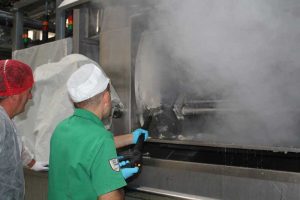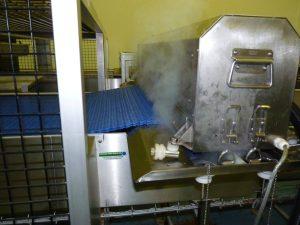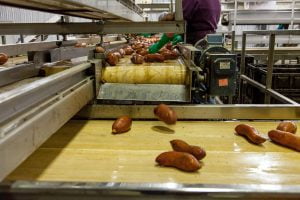In the food industry, maintaining hygienic operations is of paramount importance to ensure the safety and quality of the products being produced. Contamination from bacteria, mould, or foreign particles can lead to foodborne illnesses and spoilage, which can have serious consequences for both consumers and businesses. This is why stringent hygiene standards and practices are enforced in food processing facilities to prevent any potential hazards.
Cleanliness in food grade conveyors is particularly crucial as these systems are responsible for transporting raw materials and finished products throughout the production process. Any contamination in the conveyors can easily spread to the entire production line, leading to widespread product recalls and damage to the brand’s reputation. Therefore, implementing effective cleaning procedures for food grade conveyors is essential to ensure the safety and integrity of the food being processed.
Maintaining hygienic operations in the food industry is not only a matter of compliance with regulations but also a responsibility to consumers. Consumers expect the food they purchase to be safe for consumption, and any compromise in hygiene can lead to a loss of trust in the brand. Additionally, businesses in the food industry have a legal and moral obligation to ensure that their products meet the highest standards of safety and quality.
This means that every aspect of the production process, including the cleanliness of conveyors, must be carefully monitored and maintained. By prioritising hygienic operations, food businesses can protect their customers, safeguard their reputation, and avoid costly repercussions such as product recalls and legal liabilities. Therefore, investing in the appropriate equipment and practices for maintaining cleanliness in food grade conveyors is essential for the success and sustainability of any food processing operation.
Summary
- Hygienic operations are crucial in the food industry to ensure the safety and quality of food products.
- Challenges in maintaining cleanliness in food grade conveyors include the build-up of food residue and the risk of contamination.
- Conveyor cleaners play a vital role in ensuring hygienic operations by removing debris and maintaining a clean conveyor system.
- When choosing an efficient food grade conveyor cleaner, look for features such as easy installation, durability, and compatibility with food safety standards.
- Using a high-quality conveyor cleaner for food grade operations can lead to improved sanitation, reduced risk of contamination, and increased productivity.
Challenges in Maintaining Cleanliness in Food Grade Conveyors
Accumulation of Residues and Debris
One of the primary challenges is the accumulation of food residues, oils, and other debris on conveyor belts and components during the production process. These residues can create an ideal environment for bacterial growth and contamination if not effectively removed.
Design and Cleaning Challenges
The design of food grade conveyors, with their intricate components and hard-to-reach areas, can make thorough cleaning a time-consuming and labour-intensive task. This can lead to inefficiencies in production as downtime for cleaning needs to be carefully scheduled to minimise disruption.
Compliance with Hygiene Standards and Regulations
Food processing facilities are subject to rigorous inspections by regulatory authorities, and any failure to meet cleanliness requirements can result in penalties and even closure of the facility. Therefore, there is a constant pressure on food businesses to ensure that their conveyors are consistently clean and free from any potential contaminants. Furthermore, the use of harsh cleaning chemicals can also pose a challenge as they may not be suitable for use in food processing environments where there is a risk of chemical residues contaminating the products. Finding a balance between effective cleaning and compliance with safety regulations can be a complex task for food processing facilities.
Understanding the Role of Conveyor Cleaners in Ensuring Hygienic Operations

Conveyor cleaners play a critical role in ensuring hygienic operations in food processing facilities by effectively removing food residues, oils, and other contaminants from conveyor belts and components. These cleaners are specifically designed to address the challenges associated with maintaining cleanliness in food grade conveyors, offering solutions that are both efficient and compliant with hygiene standards. By utilising conveyor cleaners, food businesses can significantly reduce the risk of bacterial contamination and ensure that their products meet the highest standards of safety and quality.
Conveyor cleaners are designed to be highly effective at removing stubborn residues from conveyor belts and components, including hard-to-reach areas that may be inaccessible during manual cleaning. This helps to prevent the build-up of contaminants that can compromise the hygiene of the production process. Additionally, conveyor cleaners are often designed to be compatible with food grade cleaning agents, allowing for thorough cleaning without the risk of chemical residues contaminating the products.
This ensures that food processing facilities can maintain compliance with safety regulations while also achieving optimal cleanliness in their conveyors.
Features to Look for in an Efficient Food Grade Conveyor Cleaner
| Feature | Description |
|---|---|
| Material | Constructed from food grade materials such as stainless steel or FDA-approved plastics |
| Sanitization | Designed for easy and thorough cleaning to maintain food safety standards |
| Adjustability | Ability to adjust for different conveyor belt widths and heights |
| Efficiency | Effectively removes debris, grease, and other contaminants from conveyor belts |
| Compatibility | Compatible with a variety of conveyor belt types and materials |
| Durability | Constructed to withstand the rigors of food processing environments |
When selecting a conveyor cleaner for food grade operations, there are several key features to look for to ensure its efficiency and effectiveness. Firstly, it is important to consider the design of the cleaner and its ability to access all areas of the conveyor belt and components. Look for cleaners that are specifically designed for use in food processing environments and can effectively remove residues from hard-to-reach areas.
Additionally, consider the material of the cleaner to ensure that it is compatible with food grade cleaning agents and does not pose a risk of contamination. Another important feature to look for in an efficient food grade conveyor cleaner is its ease of maintenance and operation. The cleaner should be easy to install and use, with minimal downtime required for maintenance or replacement of components.
Consider cleaners that are designed for durability and longevity, reducing the need for frequent replacements and minimising disruptions to production. Furthermore, look for cleaners that offer adjustable settings to accommodate different conveyor types and cleaning requirements, providing flexibility and customisation for specific operational needs.
Benefits of Using a High-Quality Conveyor Cleaner for Food Grade Operations
Utilising a high-quality conveyor cleaner for food grade operations offers several benefits that contribute to the overall efficiency and hygiene of the production process. One of the primary benefits is the reduction of bacterial contamination and foodborne hazards by effectively removing residues from conveyor belts and components. This helps to ensure that products remain safe for consumption and meet the highest standards of quality.
Additionally, using a high-quality conveyor cleaner can contribute to improved operational efficiency by minimising downtime for cleaning and maintenance. This allows for smoother production processes with reduced disruptions. Furthermore, investing in a high-quality conveyor cleaner can lead to cost savings in the long run by reducing the need for frequent replacements and repairs.
Durable and reliable cleaners can withstand the demands of food processing environments, offering longevity and consistent performance. This helps to minimise operational costs associated with maintenance and replacement of cleaning equipment. Additionally, by maintaining optimal cleanliness in conveyors, businesses can avoid potential repercussions such as product recalls and regulatory penalties, protecting their reputation and bottom line.
Best Practices for Implementing and Maintaining a Conveyor Cleaning Regimen

Establishing a Regular Cleaning Schedule
One best practice is to establish a regular cleaning schedule that aligns with production cycles to minimise disruptions while maintaining optimal cleanliness. This may involve scheduling cleaning during planned downtime or between production runs to ensure thorough removal of residues from conveyors.
Training and Equipping Staff
Additionally, it is important to train staff on proper cleaning procedures and provide them with the necessary tools and equipment to perform cleaning tasks effectively.
Conducting Regular Inspections and Maintenance
Another best practice for maintaining a conveyor cleaning regime is to conduct regular inspections of conveyors to identify any potential issues or areas requiring attention. This proactive approach allows for early detection of contaminants or wear on conveyor components, enabling prompt action to address these issues before they escalate. Furthermore, implementing a preventive maintenance programme for conveyor cleaners can help to prolong their lifespan and ensure consistent performance. This may involve regular servicing, lubrication, and replacement of worn components to keep cleaners operating at their best.
Ensuring Hygienic Operations with the Right Conveyor Cleaner
In conclusion, maintaining hygienic operations in the food industry is essential for ensuring the safety and quality of products being produced. Cleanliness in food grade conveyors plays a crucial role in preventing contamination and upholding hygiene standards throughout the production process. While there are challenges associated with maintaining cleanliness in conveyors, utilising high-quality conveyor cleaners offers effective solutions that address these challenges while ensuring compliance with safety regulations.
When selecting a conveyor cleaner for food grade operations, it is important to consider key features such as design, compatibility with cleaning agents, ease of maintenance, and flexibility. Investing in a high-quality conveyor cleaner offers several benefits including reduced contamination risks, improved operational efficiency, and cost savings through reduced maintenance needs. By implementing best practices for maintaining a conveyor cleaning regimen, food processing facilities can uphold hygiene standards while minimising disruptions to production.
In conclusion, ensuring hygienic operations with the right conveyor cleaner is essential for protecting consumers, upholding brand reputation, and achieving long-term success in the food industry. By prioritising cleanliness in conveyors and investing in efficient cleaning solutions, food businesses can maintain compliance with safety regulations while delivering products that are safe for consumption and meet the highest standards of quality.
FAQs
What is a food grade conveyor cleaner?
A food grade conveyor cleaner is a cleaning solution specifically designed for use in food processing and packaging facilities. It is formulated to meet strict food safety regulations and is safe for use in areas where food products are handled.
What are the benefits of using a food grade conveyor cleaner?
Using a food grade conveyor cleaner helps to maintain a hygienic and safe working environment in food processing facilities. It helps to remove food residues, grease, and other contaminants from conveyor belts and equipment, reducing the risk of contamination and ensuring compliance with food safety standards.
How is a food grade conveyor cleaner different from a regular conveyor cleaner?
A food grade conveyor cleaner is specifically formulated to meet the stringent requirements of food safety regulations. It is designed to be non-toxic, non-corrosive, and safe for use in food processing environments. Regular conveyor cleaners may not meet these strict standards and could pose a risk of contamination in food production facilities.
What are the key considerations when choosing a food grade conveyor cleaner?
When choosing a food grade conveyor cleaner, it is important to consider factors such as its effectiveness in removing food residues, its compatibility with different types of conveyor belts and equipment, and its compliance with food safety regulations. It is also important to consider the ease of use and the environmental impact of the cleaner.
How should a food grade conveyor cleaner be used?
A food grade conveyor cleaner should be used according to the manufacturer’s instructions. It is typically applied to the conveyor belt or equipment, allowed to dwell for a specified period of time, and then rinsed off with water. It is important to follow proper cleaning and sanitation procedures to ensure the effectiveness of the cleaner.










